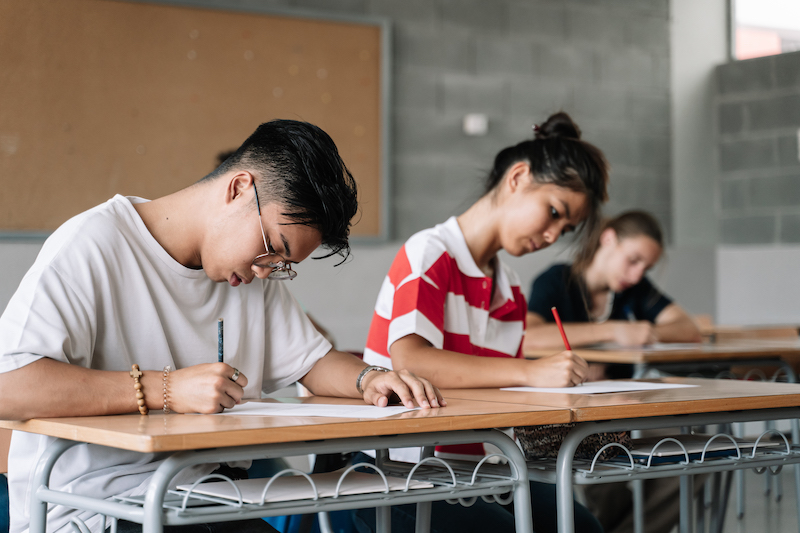A question we hear often at Ivy Scholars goes something like this: “If another student from my high school is applying to the same college I am, and they have similar grades, will that impact my chances of admission?” This is a reasonable question, and a reasonable concern for most high school students to have. After all, the high school you go to impacts your chances of getting into a great college, so your peers in high school are likely applying to similar universities as you.
In this article, then, we’ll be examining what impacts this phenomenon has. How do schools handle it when multiple students apply from the same high school? Do colleges have quotas? How will this impact your own chances of college admissions? We will be exploring the answers to all of these questions, so let’s get started!
Are you directly compared to your high school peers?
Kind of. This goes back to how colleges evaluate applicants. You are compared to a group of your peers, though what this means exactly varies by college. Admissions officers sort applicants by region first, and then often subdivide within regions by other factors, which can include race, gender, intended major, or smaller geographic areas.
Thus you are compared to other applicants from your high school, but not directly. Instead, you are likely to end up in the same pool of applications, and evaluated in the same group. This also goes into how schools read and evaluate applications; your application is not directly evaluated relative to other applicants. Instead, each applicant is reviewed against the same set of criteria by the same people, and is admitted or rejected based on that.
Your classmates at high school getting accepted or rejected by a college therefore does not impact your chances of getting accepted or rejected by that college. Of course, this is only generally true; the major complication with college applications is that there is no standardized process; each school has their own practices and principles, and is often loath to share these broadly. In general, however, your application is not directly compared to that of other students from your high school.
Do Colleges have Quotas for High Schools?
This is a related question; even if a college does not directly compare you to your peers, do they still limit how many applicants from a given school can get into the college? This is a messier question, because it is far more dependent on the practices of individual colleges and admissions offices.
Anecdotally, when I attended UChicago, it was known among the students who worked in the admissions office that the director of admissions personally handled admissions for a certain school, and they would often send 8-10 students to UChicago each year, while most high schools would only send one or two. This was not a quota system, merely a quirk showing how your high school can unknowingly impact your chances of acceptance.
For most top colleges, there is not a quota for high schools specifically, but instead a desire for geographic diversity, alongside social and economic diversity. Thus the number of students from a specific school will be limited not because they all attended the same school, but because they all had similar social, economic, and geographic profiles.
The Ivy League does not have quotas for high schools; when interviewed over the phone, representatives from Harvard stated that while they take the academic context of a student into account, they do not cut off students from a school because other students were accepted. Yale and Columbia had similar sentiments. Overall, the Ivy League affirmed that all students are judged on their own merits; while the high school you attend is taken into account, this is only done to provide context to your academic preparation.

A Note on Feeder Schools
There was a time when attending a certain high school, or a certain class of school, all but guaranteed your acceptance into the Ivy League. While this is no longer the case, feeder schools may still be found.
Historically, these were private, often boarding, schools in New England, which sent their students to the Ivy League and other top colleges. While these high schools do still send students to top colleges (one of my freshman roommates attended one), they are no longer a guaranteed track to the Ivy League.
They do, however, often send students to smaller elite liberal arts colleges at a very high rate. This includes some of the “Little Ivies,” especially the ones with smaller endowments. These schools rely on paying students to remain financially stable, and know that the students from these elite private schools will be able to pay the required tuition.
Thus feeder schools do still exist, though in a much more limited form. This is also an unofficial system, not something written in stone. Attending an elite private school is still not enough to guarantee acceptance into one of these schools, merely that your application may get an extra look.
How does this Impact You?
This brings us back to the original question: will it impact your chances of acceptance if multiple people from your high school are applying to the same college? In the end, the potential for this to impact you depends on several factors:
- What college are you applying to?
- What high school do you attend?
- How similar are you to other applicants from your school?
We’ll break down why each matters, and what you can do about it.
The College
Ivy League colleges, and institutions in their tier, are far more selective generally. While they do not maintain quotas for specific high schools, they generally only take a few students from each high school anyway, due to the level of competition for admissions generally.
The less competitive a college is, the less likely it is for multiple people from your school to be applying. This can also be true if there is something which draws students from your school to the college, like Houston students applying to UT Austin, or students at a Catholic high school applying to Notre Dame.
Your High School
While feeder high schools are no longer a sure track to the Ivy League, certain elite high schools are more well known to admissions counselors. This is both a blessing and a curse; they are more likely to accept multiple students from these schools, but they also expect more from them, and are more familiar with the opportunities the school offers.
A less well known high school is less likely to send multiple students to top schools, because admissions officers have less of a track record for performance for those students. While they still will not have a quota for those schools, there are less likely to be multiple students from these high schools who meet their standards for admission.
Standing Out
This is the most important part, because this is the only part of the equation you can still influence. When your application is read, it is evaluated on your own merits, and you are not directly compared to other applicants. You are, however, only one of thousands of applications that admissions officer will review, which means that standing out from the crowd is key.
This includes differentiating yourself from your high school classmates, especially if they are applying to the same schools. They will be the closest to you academically, regionally, and likely in terms of socio-economic status, meaning their applications are the ones which may run together with yours in the minds of admissions officers.
The best ways to differentiate yourself are through your activities and essays. Having high grades is important, but grades alone will not set you apart from other applicants; most applicants to top colleges have high grades. Instead, unique essays and deep involvement in extracurriculars are the best ways to differentiate yourself. For advice on writing these essays, see our article on supplementals. For advice on what colleges want to see in your extracurriculars, see our articles on the topic.
Final Thoughts
Multiple students from high schools will apply to the same colleges, especially as more students apply to the nation’s top schools. While you will not be directly compared to these students, you still need to stand apart from the crowds of thousands who are applying to these schools.
In this endeavor, small changes can make a big difference. If you want to hear how we can make your application stand out, or help you write the perfect essays, schedule a free consultation today. We’ve helped thousands of students on their road to college, and are always happy to hear from you.








